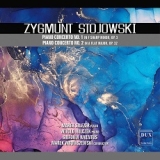 Zygmunt Stojowski: Klavierkonzerte Nr. 1 und 2; Marek Szlezer, Witold Wilczek, Klavier, Polish Sinfonia Iuventus Orchestra, Marek Wroniszewski, Zofia Guz; 1 CD Dux 1773; Aufnahme 05.2021, Veröffentlichung 20.05.2022 (69'28) - Rezension von Norbert Tischer
Zygmunt Stojowski: Klavierkonzerte Nr. 1 und 2; Marek Szlezer, Witold Wilczek, Klavier, Polish Sinfonia Iuventus Orchestra, Marek Wroniszewski, Zofia Guz; 1 CD Dux 1773; Aufnahme 05.2021, Veröffentlichung 20.05.2022 (69'28) - Rezension von Norbert Tischer
Zygmunt Stojowski (1869-1946), ein Schüler von Wladyslaw Zelenski, Léo Delibes und Ignacy Jan Paderewski, war zu Lebzeiten als Pianist international bekannt und als Komponist geschätzt. Er wurde in Polen geboren und wuchs dort auf, lebte später in Paris und wurde schließlich amerikanischer Staatsbürger.
Seine beiden Klavierkonzerte von 1890 und 1910 sind romantisch und erinnern an jene von Grieg und Saint-Saëns.
Das erste Klavierkonzert ist Anton Rubinstein gewidmet. Es enthält einen bravourösen, sehr einfallsreichen ersten Satz, worauf eine schöne Romanze folgt, die von Marek Slezer ebenso attraktiv gespielt wird wie die beiden anderen Sätze, insbesondere das rasante Allegro con fuoco.
Das zweite Konzert ist Paderewski gewidmet. Es besteht aus einem Prolog, einem Scherzo, einem Thema und zehn Variationen. Das üppig instrumentierte Werk ist für den Solisten technisch herausfordernd, aber Witold Wilczek hat damit keine Probleme. Er kann virtuos und einfühlsam spielen.
Die Begleitung ist hervorragend und entspricht dem Niveau der Solisten.
Die Tonaufnahme ist angenehm räumlich und bestens ausgewogen und trägt dazu bei, diese beiden brillanten Konzerte attraktiv werden zu lassen.
Zygmunt Stojowski (1869-1946), a pupil of Wladyslaw Zelenski, Léo Delibes, and Ignacy Jan Paderewski, was internationally renowned as a pianist and esteemed as a composer during his lifetime. Stojowski was born and raised in Poland, later lived in Paris, and eventually became an American citizen.
His two piano concertos of 1890 and 1910 are romantic and reminiscent of those by Grieg and Saint-Saëns.
The first piano concerto is dedicated to Anton Rubinstein. It contains a bravura, highly imaginative first movement, which is followed by a beautiful romance played as attractively by Marek Slezer as the other two movements, especially the rapid Allegro con fuoco.
The second concerto is dedicated to Paderewski. It consists of a prologue, a scherzo, a theme and ten variations. The lushly orchestrated work is technically challenging for the soloist, but Witold Wilczek has no problems with it. He can play virtuosically and sensitively.
The accompaniment is excellent and matches the level of the soloists.
The sound recording is pleasantly spacious and well balanced, helping to make these two brilliant concertos attractive.






















